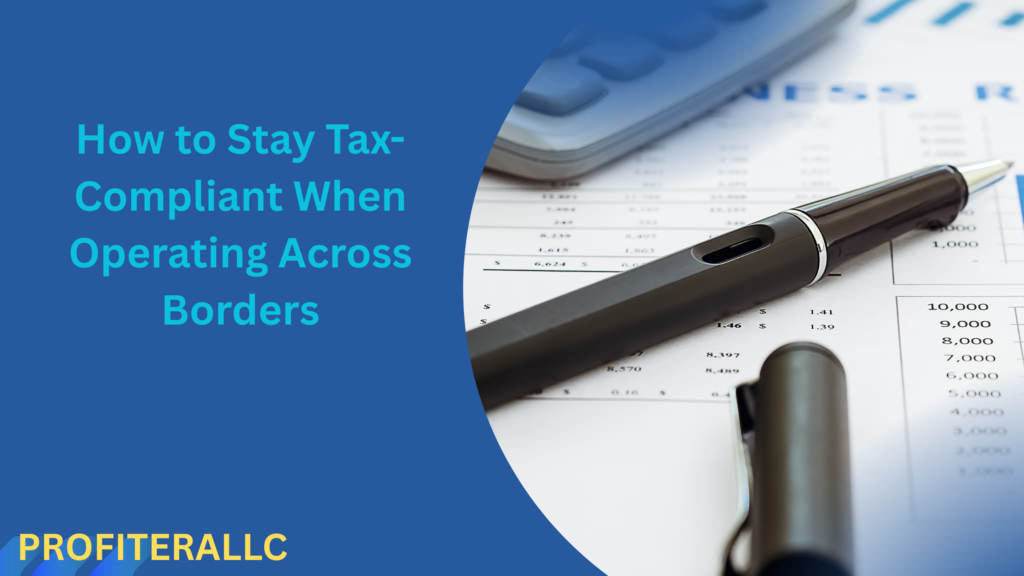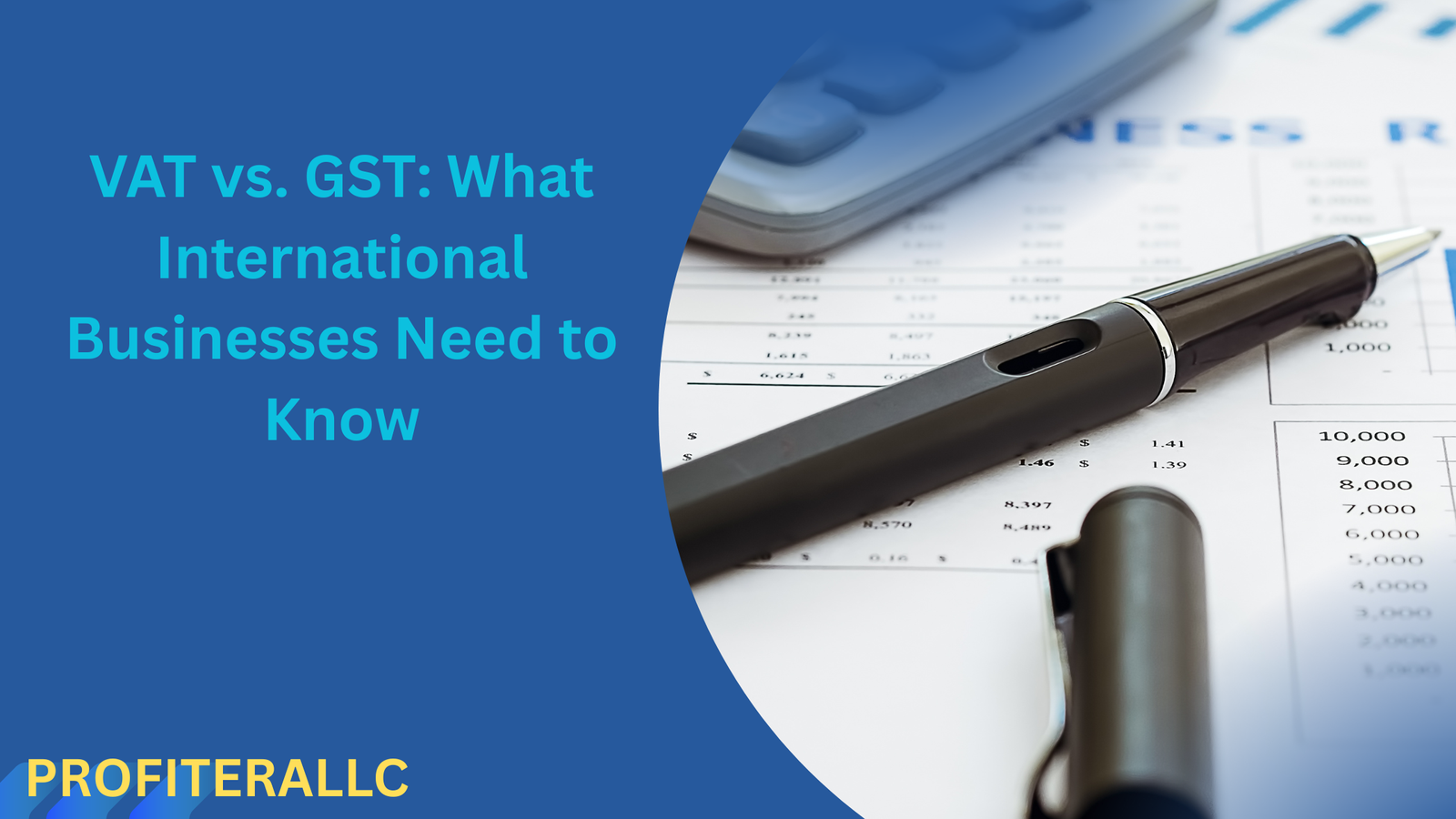
Operating across business across borders is a significant undertaking, and while it offers various growth opportunities, it also comes with complex tax obligations. Tax laws vary widely from country to country, and non-compliance can result in hefty fines, legal issues, and reputational damage. For international businesses, ensuring tax compliance requires diligent planning, staying up-to-date with regulatory changes, and understanding the nuances of each jurisdiction.
In this post, we will explore the key strategies for staying tax-compliant when operating internationally. From understanding local tax laws to managing transfer pricing and VAT/GST, we’ll guide you through the essential steps needed to avoid penalties and ensure your global operations are running smoothly.
1. Understanding Local Tax Laws
Every country has its own set of tax laws, and the first step to staying tax-compliant when operating internationally is gaining a comprehensive understanding of these laws. Whether it’s sales tax, VAT/GST, corporate income tax, or payroll taxes, local tax rules must be followed.
Different countries use varying taxation systems, so it’s essential to familiarize yourself with:
- Corporate Income Tax: Corporate tax rates and tax thresholds differ globally. Some countries impose a flat tax rate, while others have a progressive rate.
- Value-Added Tax (VAT) or Goods and Services Tax (GST): Many countries impose VAT/GST, which is a consumption-based tax. You must ensure proper registration, collection, and remittance of VAT/GST.
- Withholding Taxes: These taxes are levied on income paid to foreign entities, such as interest, dividends, or royalties. Understanding the applicable withholding tax rates and ensuring that you don’t double-tax income is crucial.
Action Tip: Use local resources, such as government websites, to get up-to-date information on tax rates and regulations in the countries you operate in.
2. Set Up Local Entities or Branches
When expanding your operations internationally, you may be required to register as a legal entity in each country where you conduct business. This can include setting up a subsidiary, branch, or representative office.
Each of these structures comes with different tax implications:
- Subsidiaries: Typically, a subsidiary is treated as a separate legal entity, and your business will need to pay taxes in that country. Subsidiaries are subject to the local tax laws but may benefit from tax treaties between countries.
- Branch Offices: A branch is an extension of the parent company and doesn’t form a separate legal entity. However, branches must comply with local tax regulations, and their profits may be taxed both locally and in the parent company’s country.
Action Tip: Consider consulting with a local tax advisor or legal expert to determine which structure best suits your international expansion strategy and to avoid any tax-related issues.
3. Transfer Pricing: The Essential Practice
Transfer pricing refers to the pricing of goods, services, or intellectual property exchanged between related entities across borders. This practice ensures that transactions between your international branches or subsidiaries are priced fairly, reflecting market rates. Many countries have strict regulations around transfer pricing to avoid profit shifting and tax avoidance.
Key Points to Understand:
- Arm’s Length Principle: Most countries follow the “arm’s length” principle, which ensures that prices for intercompany transactions are consistent with what independent entities would charge in similar circumstances.
- Documentation Requirements: Tax authorities require detailed documentation to prove that transfer prices comply with local tax laws. Failure to maintain proper records can lead to penalties and audits.
Action Tip: Implement a comprehensive transfer pricing policy, including clear documentation and justification for intercompany transactions, to avoid issues with tax authorities.
4. Managing VAT/GST and Sales Tax Compliance
Value-added tax (VAT) or goods and services tax (GST) is one of the most common taxes imposed on businesses worldwide. VAT/GST is typically charged on goods and services sold within a particular country, and businesses must collect and remit the tax to the local tax authorities.
Different countries have different VAT/GST rates and thresholds. In some countries, you may be required to register for VAT/GST even if you’re selling goods remotely, while others may exempt certain transactions or apply reduced rates.
What You Need to Know:
- VAT Registration: If you reach a certain threshold of sales in a country, you may be required to register for VAT and start collecting the tax on your sales.
- International Sales: Exporting goods or services often requires special treatment for VAT/GST. Understanding exemptions, refunds, and rates for international sales is crucial.
- Digital Services: Many countries are introducing VAT/GST requirements for digital services, especially in cases where services are provided remotely.
Action Tip: Use a tax compliance software tool to track VAT/GST registration, collection, and remittance in multiple countries. This will streamline the process and ensure accuracy.
5. Payroll Taxes and Employee Classification
When employing staff across borders, it’s essential to comply with the local payroll tax laws. Different countries have varying rules regarding employee benefits, social security contributions, and income tax withholding.
Key considerations include:
- Employee vs. Contractor: Ensure that workers are classified correctly. Misclassifying employees as independent contractors can lead to significant penalties.
- Social Security: Many countries require businesses to contribute to the social security system. These contributions can be high, and failing to comply can lead to fines and additional assessments.
- Income Tax Withholding: You’ll need to withhold the appropriate income tax from employees’ wages and remit it to local tax authorities.
Action Tip: Work with a payroll provider who understands the local tax laws in each country where you have employees to ensure accurate withholding and reporting.
6. Filing Deadlines and Record-Keeping
Tax compliance is not just about paying the correct amount of tax, but also about filing on time and keeping accurate records. Missing filing deadlines can lead to late fees, penalties, and interest charges.
Important actions to consider:
- Tax Returns: Each country has its own filing deadlines for corporate income tax, VAT/GST, payroll taxes, and other tax obligations. Missing these deadlines can result in penalties.
- Record-Keeping: Maintain proper documentation for all transactions, including invoices, receipts, and contracts. Countries may require businesses to keep records for several years, and audits are common.
Action Tip: Set up a system to track all tax filing dates and deadlines. Automating this process will ensure that you never miss an important filing.
7. Double Taxation and Tax Treaties
One of the primary concerns for businesses operating internationally is the risk of double taxation, where the same income is taxed in both the country of origin and the foreign country.
To mitigate double taxation, many countries enter into tax treaties, which provide mechanisms for reducing or eliminating taxes in certain circumstances. These treaties typically allow for a tax credit or an exemption to avoid taxing the same income twice.
Action Tip: Consult with an international tax expert to determine if any tax treaties apply to your business and to ensure you’re taking advantage of any available tax credits or exemptions.
8. Stay Updated with Changing Tax Laws
Tax laws are constantly evolving, and new regulations can significantly impact your compliance requirements. Whether it’s changes to VAT/GST rates, new reporting obligations, or evolving transfer pricing rules, staying up-to-date is crucial.
Action Tip: Subscribe to tax law newsletters, attend industry webinars, and work with a tax advisor who keeps you informed about the latest changes in the countries where you operate.
9. Leverage Global Tax Compliance Software
Managing tax compliance across borders can be time-consuming and complex. Global tax compliance software can help automate many aspects of the process, from calculating VAT/GST to managing payroll taxes and preparing tax returns. These tools can also help you stay on top of regulatory changes and filing deadlines.
Action Tip: Explore software solutions like Avalara, Thomson Reuters, or Taxify, which are specifically designed to streamline tax compliance for global businesses.
10. Seek Expert Advice
Navigating international tax compliance can be overwhelming. If you’re unsure about any aspect of your tax obligations, it’s always a good idea to seek expert advice.
A global tax advisor or consultant specializing in cross-border tax issues can provide personalized guidance on structuring your business, managing transfer pricing, and ensuring compliance with local laws.
Action Tip: Build a network of reliable tax professionals in the countries you operate in to ensure compliance and avoid costly mistakes.
Conclusion
Staying tax-compliant when operating across borders is a challenging yet essential part of running an international business. By understanding local tax laws, managing VAT/GST, adhering to transfer pricing rules, and maintaining accurate records, you can mitigate risks and ensure smooth operations. Use tax compliance software, stay updated on regulatory changes, and consult with experts to streamline your global tax strategy.
Taking proactive steps to stay compliant with tax laws in every jurisdiction you operate in will not only keep your business on the right side of the law but also build your reputation as a responsible global enterprise.






